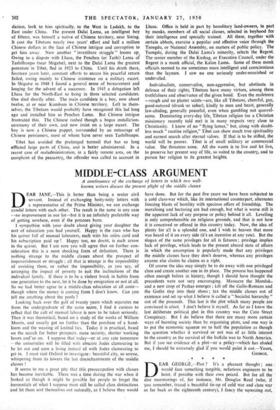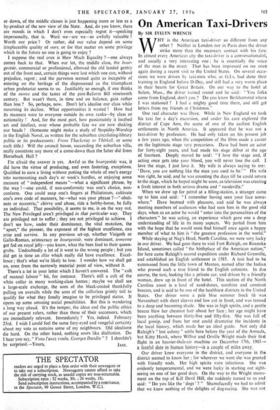MIDDLE-CLASS ARGUMENT
A continuance of the exchange of letters in which two well- known writers discuss the present plight of the middle classes
DEAR JANE,—This is better than being a senior civil servant. Instead of exchanging hoity-toity letters with a representative of the Prime Minister, we can exchange candid letters with each other. The result is the same in any case —no improvement in our lot—but it is an infinitely preferable way of getting nowhere, even if the potatoes burn.
I sympathise with your doubt about giving your daughter the sort of education you had yourself. Happy is the raan who has his quiver full of manual. labourers, each witn his kinibli card and his subscription paid up ! Happy too, no doubt, is each arrow in the quiver. But I am sure you will agree that on further con- sideration this is a most shocking form of defeatism. There is nothing strange to the middle classes about the prospect of impoverishment or struggle ; all that is strange is the impossibility of avoiding them, or rather the impossibility, as you say, of arranging the impact of poverty to suit the inclinations of the individual family. If there is to be a violent break in habits from one generation to the next, let it be done by emigration or not at all. So we had better agree to a middle-class education at all costs— though where the money is coming from I don't know. Can you tell me anything about the pools ?
Looking back over the gulf of twenty years which separates me from the undergraduate of the same name, I find it curious to reflect that the cult of manual labour is now to be taken seriously. Then it was theoretical, based on a study of the works of William • Morris, and usually got no further than the purchase of a hand- loom and the wearing of knitted ties. Today it is practical, based on the search for better prospects, more security, shorter working hours ancrso on. I suppose that today—or at any rate tomorrow —the universities will be filled with obscure Judes clamouring to be let out and earn a living instead of with hides clamouring to get in. I must visit Oxford to investigate: beautiful city, so serene, whispering from its towers the last disenchantments of the middle classes ! - It seems to me a great pity that this preoccupation with classes has become inevitable. There was a time during the war when it looked as though it might be possible for people to forget the inessentials of what I suppose must still be called class distinctions and let them sort themselves out naturally, as I believe they would have done. But for the past five years we have been subjected to a cold class-war which, like its international counterpart, alternates freezing blasts of hostility with specious offers of friendship. The moralising and hectoring are bad enough, but what is worse still is the apparent lack of any purpose or policy behind it all. Levelling is only comprehensible on religious grounds, and that is not how it is conceived or offered in this country today. Now, the idea of plenty for all is a splendid one, and I wish to heaven that more was heard of it on every side (it's an incentive at any rate). But the slogan of the same privileges for all is fatuous ; privilege implies lack of privilege, which leads to the present absurd state of affairs in which the assumption is popularly made that any privileges the middle classes have. they don't deserve, whereas any privileges anyone else claims he claims as a right.
Of course the idea may simply be to do away with one privileged class and create another one in its place. The process has happened often enough before in history, though I should have thought the precedents were not very encouraging. Massacre the Marriluks and a new crop of Pashas emerges ; kill off the Gallo-Romans and the Goths step into their shoes; tax the middle classes out of existence and set up what I believe is called a "Socialist hierarchy" out of the proceeds. This last is the plot which many people are convinced is afoot. I don't believe it myself. As far as I know the last deliberate political plot in this country was the Cato Street Conspiracy. But I do believe that there are many more certain ways of harming society than by organising plots, and one way is to put the economic squeeze on to half the population as though the question whether it survived or not was of as little interest to the country as the survival of the buffalo was to North America. But if you see evidence of a plot—or a policy—which has eluded me, I should be extremely glad if you would point it out.—Yours, GEORGE.
) * * * *
DEAR GEORGE,—Plot? It's a pleasant thought ; one. would face something tangible, nefarious engineers to be hoist, if possible with their own petard. But for all the - dire murmurings of, for instance, Mr. Douglas Reed (who, if -you remember, traced 'a beautiful tie-up of cold war and class war as far back as the eighteenth century), I fancy the squeezing out,
or down, of the middle classes is just happening more or less as a by-product of the new view of the State. And, do you know, there are moods in which I don't even especially regret it—speaking Impersonally, that is. Were we—are we—so awfully valuable ? Worth our price ? Or rather, did our value depend on some irreplaceable quality of ours, or for that matter on some privilege which in the future no one is going to enjoy ?
I suppose the real crux is How Much Equality ?—one always comes back to that. When our lot, the middle class, the bour- geoisie, commercial or 'professional, elbowed the old landed gentry out of the front seat, certain things were lost which one can, without prejudice, regret ; and the parvenus seemed quite as incapable of entering on the heritage of the dispossessed as the triumphant urban proletariat seems to us. Justifiably so enough, if one thinks of the mores and the tastes of the post-Reform Bill nineteenth century. But wasn't there, in time and on balance, gain rather than loss ? So, perhaps, now. Don't let's idealise our class while mourning its decline. What opportunities it wasted ! How bad its manners were to everyone outside its own ranks—by class or nationality! And, for the most part, how passionately it loathed art and intellect, over whose probable fate we are now shaking our heads ! (Someone might make a study of Stupidity-Worship in the English Novel, as written for the suburban circulating-library public or its predecessors: From Thackeray to Thirkell, or some such title.) Will the council house, succeeding the suburban villa, really constitute any more of a come-down than the latter did from Horseback, Hall ? I'm afraid the answer is yes. Awful as the bourgeoisie was, it did have the virtue of producing, and even fostering, exceptions. Qualified to earn a living without putting the whole of one's energy into surmounting each day's or week's hurdles, or enjoying some measure of "independent means "—what a significant phrase, by the way 1—one could, if non-conformity was one's choice, non- conform. One could snap one's fingers at Philistinism, cultivate one's own code of manners, be—what was your phrase ?—" obsti- nate or eccentric," chivvy and abuse, ride a hobby-horse, be fully an individual. That possibility, it seems to me, is on the way out. The New Privileged aren't privileged in that particular way. They are privileged not to suffer ; they are not privileged to achieve. I don't see how, under their dominance, the vital mutation, the "sport," the pioneer, the exponent of the highest excellence, can arise and survive. In any previous set-up, whether Visigoth or Gallo-Roman, aristocracy or bourgeoisie, were dominant, someone got fed on royal jelly—you know, what the bees feed to their queen- grubs. Undoubtedly a lot of it went to the wrong people ; but you did get in time an elite which really did have excellence. Excel- lence; that's what we're likely to lose. I wonder how we shall get on, even from the narrowly material point of view, without it.
There's a lot in your letter which I haven't answered. The "cult of manual labour" bit, for instance. There's still a cult of the white collar in many working-class homes ; maybe we shall see a large-scale exchange, the sons of the black-coated thankfully pulling on overalls while the sons of the collarless grimly toil to qualify for what they fondly imagine to be privileged status. It opens up some amusing social possibilities. But this is wandering a long way ahead. It's the temper, the ideas and the public ethics of our present rulers, rather than those of their successors, which are immediately relevant. Immediately ? Yes, indeed. February 23rd. I wish I could feel the same fiery-eyed and vengeful certainty about my vote as sustains some of my neighbours. Old idealisms die hard. On the other hand, nothing sours like disillusion. Do I hear you say," Vous l'avez voulu. Georges Dandin" ? I shouldn't











































 Previous page
Previous page